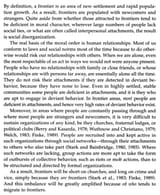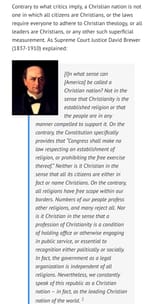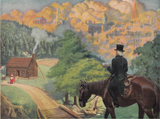>>17822902>The founding fathers outright said America is not a Christian nation multiple timesThat's not what is written in the actual legal documents. America has always been implicitly Christian, and the idea of freedom of conscience is a Biblical value.
The Supreme Court explicitly affirms that America is a Christian nation. This is far more relevant. See the following two SCOTUS decisions:
Church of the Holy Trinity v United States (1892)
https://supreme.justia.com/cases/federal/us/143/457/
This unanimous court ruling reads:
"These, and many other matters which might be noticed, add a volume of unofficial declarations to the mass of organic utterances that this is a Christian nation. In the face of all these, shall it be believed that a Congress of the United States intended to make it a misdemeanor for a church of this country to contract for the services of a Christian minister residing in another nation?"
United States v Macintosh (1931)
https://supreme.justia.com/cases/federal/us/283/605/
The prevailing majority decision reads:
"We are a Christian people (Holy Trinity Church v. United States, 143 U. S. 457, 143 U. S. 470-471), according to one another the equal right of religious freedom and acknowledging with reverence the duty of obedience to the will of God."
The origin of the Establishment clause in the First Amendment, which establishes freedom of religion has its origins in the Rhode Island colonial charter. John Clarke petitioned for that charter in the following way in 1663:
"That they might be permitted to hold forth a lively experiment that a most flourishing civil state may stand, and best be maintained, with a full liberty in religious concernments; and that true piety, rightly grounded upon gospel principles, will give the best and greatest security to sovereignty, and will lay in the hearts of men the strongest obligation to true loyalty."
- The appeal of John Clarke to Charles II for the charter of Rhode Island (1663)







